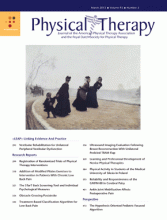Abstract
Background Psychologically informed practice emphasizes routine identification of modifiable psychological risk factors being highlighted.
Objective The purpose of this study was to test the predictive validity of the STarT Back Screening Tool (SBT) in comparison with single-construct psychological measures for 6-month clinical outcomes.
Design This was an observational, prospective cohort study.
Methods Patients (n=146) receiving physical therapy for low back pain were administered the SBT and a battery of psychological measures (Fear-Avoidance Beliefs Questionnaire physical activity scale and work scale [FABQ-PA and FABQ-W, respectively], Pain Catastrophizing Scale [PCS], 11-item version of the Tampa Scale of Kinesiophobia [TSK-11], and 9-item Patient Health Questionnaire [PHQ-9]) at initial evaluation and 4 weeks later. Treatment was at the physical therapist's discretion. Clinical outcomes consisted of pain intensity and self-reported disability. Prediction of 6-month clinical outcomes was assessed for intake SBT and psychological measure scores using multiple regression models while controlling for other prognostic variables. In addition, the predictive capabilities of intake to 4-week changes in SBT and psychological measure scores for 6-month clinical outcomes were assessed.
Results Intake pain intensity scores (β=.39 to .45) and disability scores (β=.47 to .60) were the strongest predictors in all final regression models, explaining 22% and 24% and 43% and 48% of the variance for the respective clinical outcome at 6 months. Neither SBT nor psychological measure scores improved prediction of 6-month pain intensity. The SBT overall scores (β=.22) and SBT psychosocial scores (β=.25) added to the prediction of disability at 6 months. Four-week changes in TSK-11 scores (β=−.18) were predictive of pain intensity at 6 months. Four-week changes in FABQ-PA scores (β=−.21), TSK-11 scores (β=−.20) and SBT overall scores (β=−.18) were predictive of disability at 6 months.
Limitations Physical therapy treatment was not standardized or accounted for in the analysis.
Conclusions Prediction of clinical outcomes by psychology-based measures was dependent upon the clinical outcome domain of interest. Similar to studies from the primary care setting, initial screening with the SBT provided additional prognostic information for 6-month disability and changes in SBT overall scores may provide important clinical decision-making information for treatment monitoring.
Footnotes
Dr Beneciuk, Dr Fritz, Dr Robinson, Dr Asal, Dr Nisenzon, and Dr George provided concept/idea/research design. Dr Beneciuk, Dr Bishop, Dr Robinson, Dr Asal, and Dr George provided writing. Dr Beneciuk and Dr Nisenzon provided data collection. Dr Beneciuk, Dr Bishop, Dr Robinson, and Dr Nisenzon provided data analysis. Dr Beneciuk provided project management. Dr Beneciuk, Dr Robinson, and Dr George provided fund procurement. Dr Bishop, Dr Fritz, Dr Robinson, Dr Asal, Dr Nisenzon, and Dr George provided consultation (including review of manuscript before submission).
The authors acknowledge the following clinicians and personnel from Brooks Rehabilitation in Jacksonville, Florida (Ryan Reed, M. Brian Hagist, Tim Shreve, Jason Kral, Matthew Stafford, Michael Spigel, Holly Morris, Flo Singletary, Amanda Osborne, and Robert Rowe), and the University of Florida Orthopaedics and Sports Medicine Institute and Shands Rehabilitation Center at Magnolia Parke in Gainesville, Florida (Giorgio Zeppieri, Josh Barabas, Debi Jones, Derek Miles, Zack Sutton, Dalton Reed, Michael Hodges, Shannon Long, Tim Shay, Amy Borut, and Yvette Silvey). Dr Robinson's laboratory (Calia Torres and Laura Wandner) assisted with data collection and management.
This study was approved by the University of Florida's Institutional Review Board.
This study was funded by a 2009 award from the Brooks Health System to the University of Florida Foundation (Dr Beneciuk and Dr George). Dr Beneciuk was supported by a National Institutes of Health T32 Neuromuscular Plasticity Research Training Fellowship Grant (T32 HD043730).
- Received May 23, 2012.
- Accepted October 19, 2012.












